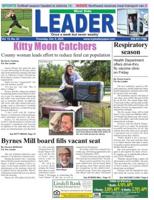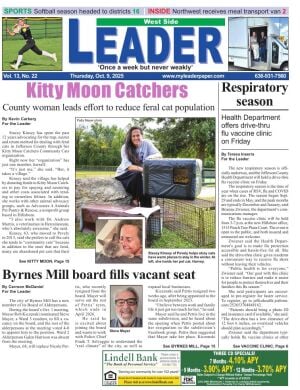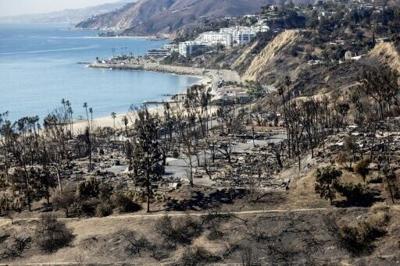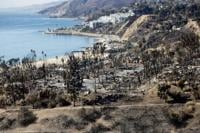Authorities investigating one of the deadly fires that tore through Los Angeles in January said Wednesday they had arrested a man they believe deliberately started the blaze.
The arrest comes as America's second-largest city is still grappling with the aftermath of two huge fires that together killed 31 people and left thousands of acres (hectares) in ruins, as they displaced thousands of people.
Jonathan Rinderknecht, 29, was taken into custody in Florida on suspicion of destruction of property by means of fire, Acting United States Attorney Bill Essayli said.
"The complaint alleges that a single person's recklessness caused one of the worst fires Los Angeles has ever seen, resulting in death and widespread destruction in Pacific Palisades," he said.
Rinderknecht is alleged to have ignited the Palisades Fire in the early minutes of New Year's Day on a popular hiking trail above the well-heeled suburb, which is home to celebrities and is one of the most sought-after pieces of real estate in the United States.
The blaze was initially contained by firefighters, but smoldered underground in the roots of plants.
Investigators believe powerful winds that swept through the area a week later reignited it.
Those flames grew to engulf Pacific Palisades and parts of Malibu, destroying thousands of homes and killing a dozen people.
A separate fire that erupted in the more modest suburb of Altadena at the same time also caused devastation over a wide area, killing 19 people.
- AI images -
Essayli said Rinderknecht, who lived in Pacific Palisades at the time, was working as an Uber driver in the area and had dropped passengers off moments before he ignited the blaze.
At a press conference, investigators showed AI-generated images that they allege the suspect had created in the weeks before the blaze, showing a cityscape on fire.
Rinderknecht was also alleged to have repeatedly watched the video for a French rap track that included images of fire.
Kenny Cooper of the Bureau of Alcohol, Tobacco, Firearms and Explosives (ATF), one of the agencies that investigated the fire, said he could not speak to motive at this stage.
"I wish we could get into somebody's head, but we can't," he said. "Evil people do evil things."
The two major fires that gripped the Los Angeles area in January were among the deadliest blazes in California history.
They were also one of the costliest natural disasters ever, with estimates of damage running into hundreds of billions of dollars.
Firefighters struggled for days to contain the fires, hampered by 100-mile (160-kilometer) -an-hour winds that prevented them from using helicopters and planes.
The scale of the blazes created difficulties, as did an urban water supply that was never designed to cope with such enormous conflagrations.
The arrest came after an intense investigation, with speculation that errant fireworks may have sparked the Palisades Fire.
In July, the Southern California Edison power company said it would begin paying compensation to those affected by the Eaton Fire that destroyed Altadena.
While no official cause of the fire has been revealed yet, the finger of blame has been pointing for months at a power line in the hills behind Altadena.
Several videos and witness accounts suggest the equipment produced sparks that could have caused the fast-moving conflagration.
hg/acb




